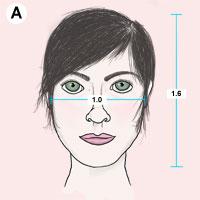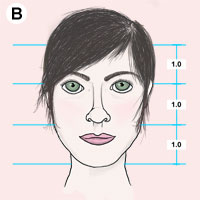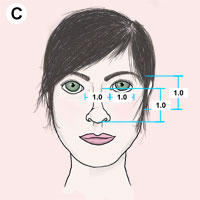Facial Balancing with Dermal Fillers
In recent years, “Facial balancing” has become a buzz phrase in the aesthetic industry. So, what is facial balancing? This practice refers to harmonizing facial features, ensuring that everything from your forehead to your chin are in the correct ratio. The concept on facial balancing started during the European Renaissance, when renowned artist and architects used an equation known as the “golden ratio” to map out their masterpiece. Thousands of years later, scientist applied the “golden ratio” formula to beauty and facial symmetry to determine the true meaning of beauty.
The Golden Ratio States:



- A visually balanced face is 1.618 times longer than it is wide.
- The distance from the hairline to between the eyes, from between the eyes to the bottom of the nose, and from the bottom of the nose to the bottom of the chin should all be the same distance.
- The length of an ear equals the length of the nose and the width of an eye is equal to the distance between the eyes.
Facial balancing is most often performed with hyaluronic acid based fillers. As with anything in life there are pros and cons to this treatment.
Pros:
- The results are most often immediate, with patients leaving the office with visible results.
- Not a surgical approach so there is no scarring, anesthesia or extended downtime.
- Most fillers used are reversible if patient is not satisfied with results.
- Topic numbing is applied and there is numbing in the product, so, the treatment is virtually painless.
- The in-office treatment takes anywhere from 1-2 hours with you being able to return to normal activities directly following the appointment.
- Cost is much lower than any surgical approach to facial reconstruction.
- Facial balancing is completely customizable and tailored to each individual patient’s need.
Cons:
- The effects of dermal fillers are not permanent, with most fillers lasting anywhere from 1-1.5 years with minor touch ups needed.
- While the fillers can offer great results, they cannot provide the kind of structural changes you would see from a facelift or nose job.
- Typically, most filler and injectable side effects are mild to moderate. Patients usually experience minor bruising for 24 hours to several days. Other symptoms include rashes, swelling, and potential infection. Filler can migrate from desired area over time, or develop lumps under the skin, although extremely rare.
In conclusion, facial balancing is an art that requires skills, expertise, and understanding of facial aesthetics. Through these soft tissue fillers, you can correct issues of asymmetry while gaining natural results to increase your self-confidence. If you have been considering filler or learning more about facial balancing we would love to schedule a consult for you.
